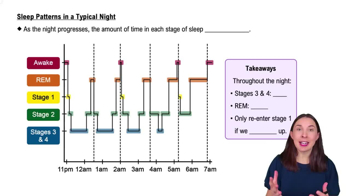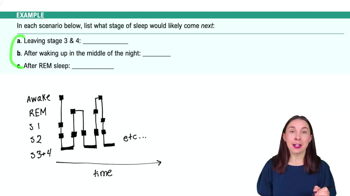Table of contents
- 1. Introduction to Psychology1h 43m
- 2. Psychology Research2h 20m
- 3. Biological Psychology2h 41m
- 4. Sensation and Perception28m
- 5. Consciousness and Sleep32m
- 6. Learning41m
- 7. Memory34m
- 8. Cognition37m
- 9. Emotion and Motivation35m
- 10. Developmental Psychology33m
- 11. Personality48m
- 12. Social Psychology41m
- 13. Stress and Health41m
- 14. Psychological Disorders44m
- 15. Treatment47m
5. Consciousness and Sleep
Sleep
Struggling with Psychology?
Join thousands of students who trust us to help them ace their exams!Watch the first videoMultiple Choice
Which statement about sleep apnea is true?
A
It causes a person to slip suddenly into REM sleep during the day.
B
There is no effective treatment for it.
C
It may stop a person's breathing for 10 seconds or more.
D
It causes SIDS.
 Verified step by step guidance
Verified step by step guidance1
Understand the definition of sleep apnea: Sleep apnea is a sleep disorder characterized by pauses in breathing or periods of shallow breathing during sleep.
Identify the symptoms and effects of sleep apnea: One of the main symptoms is that it can cause a person's breathing to stop for 10 seconds or more during sleep.
Differentiate sleep apnea from other sleep disorders: For example, narcolepsy is a disorder that causes a person to suddenly fall into REM sleep during the day, which is different from sleep apnea.
Consider the treatment options for sleep apnea: There are effective treatments available, such as CPAP (Continuous Positive Airway Pressure) machines, which help keep the airway open during sleep.
Clarify misconceptions: Sleep apnea is not directly linked to causing SIDS (Sudden Infant Death Syndrome), which is a separate condition affecting infants.

 3:25m
3:25mWatch next
Master Circadian Rhythms with a bite sized video explanation from Hannah Gordils
Start learningRelated Videos
Related Practice


































































































![Race, Genes and IQ Differences | Bret Weinstein [Mini Clip]](https://img.youtube.com/vi/IztL_m3pd70/mqdefault.jpg)



































































































